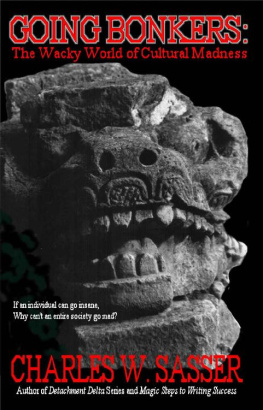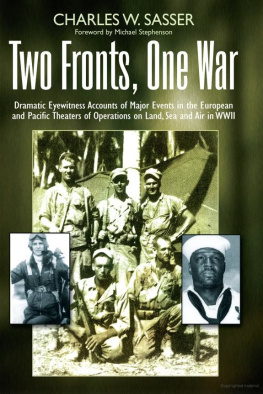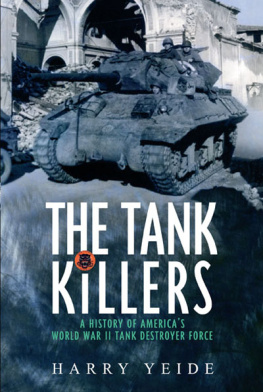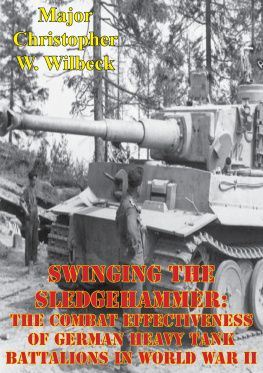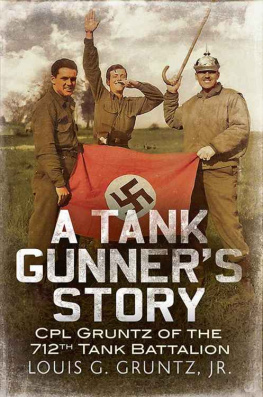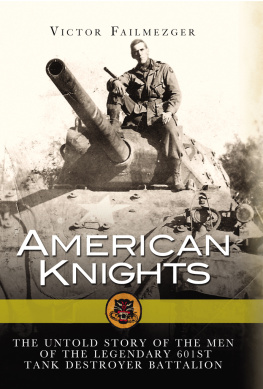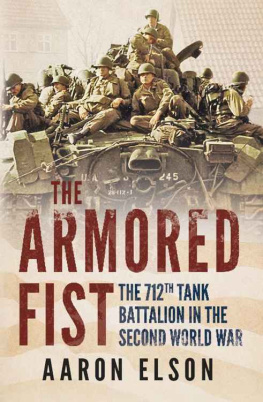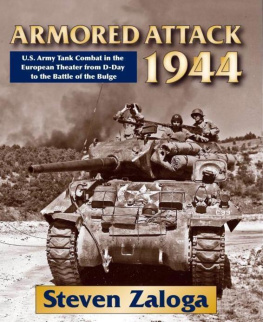Holmes whipped out his .45 pistol and thrust the muzzle against his drivers temple. Sergeant Stevens wasnt the only tough, nasty maverick in Able Company.
Ill blow your gawd damned brains out, Holmes snarled. When I tell you to kill somebody, you kill him. Turn this gawd damned tank around and keep the main gun on the haystack. God, damn you, go!
That settled the issue. Simmons charged the haystack like a monstrous knight. Sergeant Holmes took over the bow machine gun and chattered deadly streams of tracers into the hay.
Two unnerved Jerries in gray-green battle dress flew out of the hay with their arms stretched above their heads, shouting frantically in German and broken English: Kameraden! Kameraden! No shoot! No shoot!
Simmons stopped the tank directly in front of them. The steel monster crouched there, rumbling in a deep growl, with its main gun pointed directly at the Krauts chests. Holmes cracked the turret hatch. These guys didnt look so fucking bad; one of them was no more than a kid.
Kameraden! Kameraden!
Yeah, great, Holmes said. Okay, you Kraut bastards, drop your gear. Understand? Drop everything.
OTHER BOOKS BY CHARLES W. SASSER
Crosshairs on the Kill Zone*
Hill 488*
Detachment Delta: Operation Deep Steel
Magic Steps to Writing Success
Detachment Delta: Operation Iron Weed
Going Bonkers: The Wacky World of Cultural Madness Encyclopedia of Navy SEALs
Detachment Delta: Punitive Strike
Detachment Delta: Operation Cold Dawn
Raider
Taking Fire (coauthored with Ron Alexander)
The Return
Arctic Homestead
Operation No Mans Land (writing as Mike Martell)
Liberty City
At Large
First Seal (coauthored with Roy Boehm)*
Smoke Jumpers
Always a Warrior
Homicide!
Last American Heroes (coauthored with Michael Sasser)
The 100th Kill
One ShotOne Kill (coauthored with Craig Roberts)*
Shoot to Kill*
The Walking Dead (coauthored with Craig Roberts)*
*Available from Pocket Books
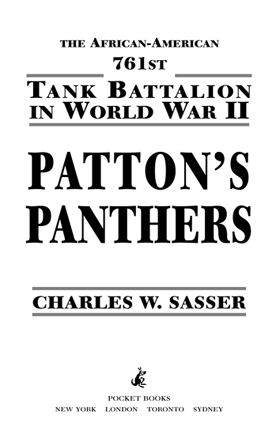
An Original Publication of POCKET BOOKS

POCKET BOOKS, a division of Simon & Schuster, Inc.
1230 Avenue of the Americas, New York, NY 10020
www.SimonandSchuster.com
Copyright 2004 by Charles W. Sasser
All rights reserved, including the right to reproduce this book or portions thereof in any form whatsoever.
For information address Pocket Books, 1230 Avenue of the Americas, New York, NY 10020
ISBN: 0-7434-8500-9
ISBN-13: 978-0-743-48500-5
eISBN-13: 978-1-439-10390-6
First Pocket Books printing February 2005
10 9 8 7 6 5 4 3 2 1
POCKET and colophon are registered trademarks of Simon & Schuster, Inc.
Designed by Jaime Putorti
Manufactured in the United States of America
For information regarding special discounts for bulk purchases, please contact Simon & Schuster Special Sales at 1-800-456-6798 or business@simonandschuster.com.
THIS BOOK IS DEDICATED TO PATTONS PANTHERS, THOSE STILL LIVING AND THOSE HONORABLY DEAD.
GENERAL GEORGE S. PATTON, JR.
A colored soldier cannot think fast enough to fight in armor.
Authors Note
The purpose of this book is not solely to record a history of the all-black 761st Tank Battalion of World War II, the Black Panthers, although I trust it will contribute in at least some minor way to a better understanding of the role black Americans played in the war. More important, what I hope to accomplish is to capture the essence of what it meant to these black men to be recognized and accepted as part of an American effort. It is not a book about race and racismthere are enough of thosealthough these topics must, of course, be addressed. It is, instead, a book about soldiers and uncommon valor in combat. Valor has no skin color.
The task proved to be a daunting one. To begin with, during particular periods of time in the United States, the achievements of black people were either officially ignored or downplayed. That means documentary trails tend to be faint or nonexistent. Also, with the passage of nearly sixty years, the memories of those who participated in such events have grown dim, recalled only episodically and incompletely. Time has a tendency to erode memory in some areas and selectively enhance it in others. I understand that. I served twenty-nine years in the military myself, combat time included. What I remember, and it was more recently than World War II, is merely highlights and snatches of events. I have long lost many of the details.
Therefore, in reconstructing the story of the 761st, I have had to rely on numerous sources to fill in gaps left by memory and official record. Also, using my own knowledge and experience with war and with men at war, I have had to improvise and to necessarily recreate scenes and dialogue in certain instances. Few of us can remember word for word conversations that occurred last year, much less sixty years ago. Where recreation occurs, I strive to match personalities with the situation and the action while maintaining factual content. The recounting of some events may not correspond precisely with the memories of all involved. In addition, all data have been filtered through the author. I must therefore apologize to anyone omitted, neglected, or somehow slighted in the preparation of this book. To those of the 761st not named, I extend a particular apology. I do not intend to diminish your accomplishments or war records. It is simply that there are too many of youmore than one thousand, counting replacementsto list in a book. It would require a book of its own merely to name you individually and recount your exploits. I must therefore take complete responsibility for errors and omissions and ask to be forgiven for them.
The core of this book is built around interviews with surviving Black Panthers, gracious and kind men like Johnnie Stevens, Johnny Holmes, Bill Latimer, E. G. McConnell, William McBurney, John McNeil, Floyd Dade, Kenneth Hamm, and George Blake. Taffy Bates, the lovely widow of the commander of the 761st, Lieutenant Colonel Paul Bates, was gracious enough to give freely of her time not only to help me understand Colonel Batess role in building the battalion but also to provide one of the warmest love stories to come out of the war. I would like to thank all these fine people who participated in reliving experiences, filling in the gaps of history, and sharing with me much of the drama that appears in these pages. Their help in the monumental task of researching and writing this book made a difficult project an enjoyable experience.
A variety of other sources also contributed in the building of this book: official U.S. military documents and After Action Reports; diaries; newspapers, books, and other published accounts; interviews with witnesses other than members of the battalion, and other authorities. I wish to thank all these sources for helping make this book possible.
I wish to particularly thank Joe Wilson, Jr., for his patience and time in directing me into this project, answering my questions along the way, and assisting in more ways than I can name. His friendship is something I have come to value.
Other particular thanks go to editor Kevin Smith at Pocket Books. It was he who clipped a newspaper article about a 761st reunion and encouraged me to begin this rewarding project. Also thanks to my longtime literary agent and friend, Ethan Ellenberg, who has guided and directed my writing career for some twenty years.


